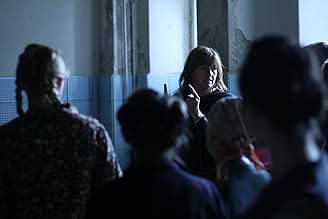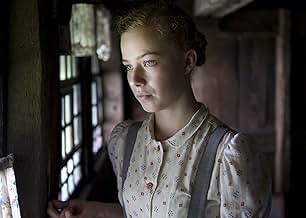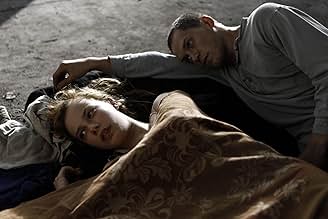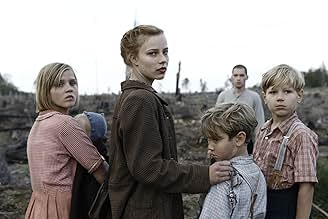AVALIAÇÃO DA IMDb
7,1/10
16 mil
SUA AVALIAÇÃO
Enquanto os Aliados percorrem a Alemanha, Lore leva seus irmãos numa viagem que os expõe à verdade das crenças de seus pais. Um encontro com um misterioso refugiado força Lore a confiar em u... Ler tudoEnquanto os Aliados percorrem a Alemanha, Lore leva seus irmãos numa viagem que os expõe à verdade das crenças de seus pais. Um encontro com um misterioso refugiado força Lore a confiar em uma pessoa que sempre lhe foi ensinada a odiar.Enquanto os Aliados percorrem a Alemanha, Lore leva seus irmãos numa viagem que os expõe à verdade das crenças de seus pais. Um encontro com um misterioso refugiado força Lore a confiar em uma pessoa que sempre lhe foi ensinada a odiar.
- Direção
- Roteiristas
- Artistas
- Prêmios
- 34 vitórias e 34 indicações no total
Kai-Peter Malina
- Thomas
- (as Kai Malina)
Nick Holaschke
- Baby Peter
- (as Nick Leander Holaschke)
Claudia Geisler-Bading
- Ox Cart Woman
- (as Claudia Geisler)
Hanne B. Wolharn
- School House Woman 3
- (as Hanne Wolharn)
- Direção
- Roteiristas
- Elenco e equipe completos
- Produção, bilheteria e muito mais no IMDbPro
Avaliações em destaque
Director/writer Cate Shortland has created something truly remarkable, forcing us to find within ourselves sympathy for a young Nazi. The story is grim and dense, but features one hell of a lead performance. Shortland combines wonderful visuals with a brutal story of survival, involving family and patriotism, and a running commentary on the state of Germany after the fall of the Third Reich.
As the German army collapses in the spring of 1945, the breakdown of a family serves as a microcosm of a country in despair in the closing days of World War II. Lore (Saskia Rosendahl) and her four younger siblings are abandoned as their Nazi- supporting parents are forced to flee the Allied forces. As they travel on foot to their grandmother's house in Hamburg, the children encounter a young Jewish refuge, Thomas, on whom they are forced to rely for both food and safe passage through Ally-occupied lands. As she is exposed to the lies of their parents, and begins to develop feelings for one whom she has been taught to hate, Lore is forced to come to terms with a belief system that is quickly unraveling.
It's the children that have to do all the heavy lifting in the film dramatically, and they carry their weight, and then some. The film is anchored by a remarkable lead performance from Rosendahl, who comes across as a seasoned veteran, despite this being her debut performance. Her character goes from obnoxious adolescent to young adult, via a series of confronting moments where her morals and beliefs are challenged. Her vibrant youthful spirit is replaced with a burning rage with a war torn Europe as the backdrop.
A new perspective on an event often forces an audience to confront disturbing realities they may wish to avoid. Although "Lore" relates a story from the second world war, it reveals the point of view of those we do not often consider: children of a high-ranking Nazi official. This story may not be pleasant, but it is certainly fascinating.
As the German army collapses in the spring of 1945, the breakdown of a family serves as a microcosm of a country in despair in the closing days of World War II. Lore (Saskia Rosendahl) and her four younger siblings are abandoned as their Nazi- supporting parents are forced to flee the Allied forces. As they travel on foot to their grandmother's house in Hamburg, the children encounter a young Jewish refuge, Thomas, on whom they are forced to rely for both food and safe passage through Ally-occupied lands. As she is exposed to the lies of their parents, and begins to develop feelings for one whom she has been taught to hate, Lore is forced to come to terms with a belief system that is quickly unraveling.
It's the children that have to do all the heavy lifting in the film dramatically, and they carry their weight, and then some. The film is anchored by a remarkable lead performance from Rosendahl, who comes across as a seasoned veteran, despite this being her debut performance. Her character goes from obnoxious adolescent to young adult, via a series of confronting moments where her morals and beliefs are challenged. Her vibrant youthful spirit is replaced with a burning rage with a war torn Europe as the backdrop.
A new perspective on an event often forces an audience to confront disturbing realities they may wish to avoid. Although "Lore" relates a story from the second world war, it reveals the point of view of those we do not often consider: children of a high-ranking Nazi official. This story may not be pleasant, but it is certainly fascinating.
Lore (2012)
A gorgeous, depressing, rare film about a family of Germans who need to survive the chaos and poverty of the end of World War II. This is a really terrific movie even though it has a single, basic, ongoing, sad arc--moving from place to place in search of food and safety as the Allies, mostly unseen, take over administration of the country in 1945. What it manages to say is not just that war is bad, or that people have the ability to survive anything if they must, but that beliefs and politics are stubborn and irrational.
It's this last part that comes through it all as the shining purpose. It's one thing for this band of children to beg for food or walk though forests weary and assaulted by marauders. But to have them run into others who, like themselves, don't know where to turn or what is going on, and still have a devotion bordering on worship for the fuhrer is mind blowing. But believable.
The filming--scenes, light, color, moving camera, and the sheer range of all of these from scene to scene--is stunning, absolutely terrific. As you might grow weary of all the weariness, you never grow weary of the movie because it's so rich in other ways. And it's never dull, either, as characters come and go and their motivations turn on a dime. How it ends, both literally and emotionally, will stay a surprise, and yet when it happens it makes such perfect sad undramatic sense.
There are all kinds of war movies, and this is an important insight into one of the least explored aspects to it all--the terrible aftermath. It's an Australian production, mainly, shot in Germany in German. And it's a really special, thoughtful, beautiful film.
A gorgeous, depressing, rare film about a family of Germans who need to survive the chaos and poverty of the end of World War II. This is a really terrific movie even though it has a single, basic, ongoing, sad arc--moving from place to place in search of food and safety as the Allies, mostly unseen, take over administration of the country in 1945. What it manages to say is not just that war is bad, or that people have the ability to survive anything if they must, but that beliefs and politics are stubborn and irrational.
It's this last part that comes through it all as the shining purpose. It's one thing for this band of children to beg for food or walk though forests weary and assaulted by marauders. But to have them run into others who, like themselves, don't know where to turn or what is going on, and still have a devotion bordering on worship for the fuhrer is mind blowing. But believable.
The filming--scenes, light, color, moving camera, and the sheer range of all of these from scene to scene--is stunning, absolutely terrific. As you might grow weary of all the weariness, you never grow weary of the movie because it's so rich in other ways. And it's never dull, either, as characters come and go and their motivations turn on a dime. How it ends, both literally and emotionally, will stay a surprise, and yet when it happens it makes such perfect sad undramatic sense.
There are all kinds of war movies, and this is an important insight into one of the least explored aspects to it all--the terrible aftermath. It's an Australian production, mainly, shot in Germany in German. And it's a really special, thoughtful, beautiful film.
I just saw this film at the Camera Cinema Club in San Jose. This is an immensely complicated film about the children of an SS officer and war criminal. The father disappears. The mother gives herself over to the Americans, and the children (aged 15 down to 7 months) are left to fend for themselves and make a 500km trip to their grandmother's in Hamburg. Germany is in ruins. People are starving and sick. They deny the Holocaust and mourn their dead leader who committed suicide in a bunker. Throughout it all, the 15-year-old lead character Lore must somehow get her siblings to grandma's house while slogging through the chaos of the failed Third Reich.
As I said, it's immensely complicated. It feels like a slice of life even if it is fiction. The cinematography is excellent. The lead actress, all of 19 in real life, is obviously very talented. I gave the film a 7 out of 10 because it's a bit too disjointed for my tastes, but perhaps that's an effective way to portray Germany's disarray at the end of the war.
As I said, it's immensely complicated. It feels like a slice of life even if it is fiction. The cinematography is excellent. The lead actress, all of 19 in real life, is obviously very talented. I gave the film a 7 out of 10 because it's a bit too disjointed for my tastes, but perhaps that's an effective way to portray Germany's disarray at the end of the war.
Lore is an intense drama involving a period of post-WW II German society that is rarely if ever examined and to do it, as this film does, from the viewpoint of German children caught up in these tragic days is worth a visit just out of curiosity. However, this film does not just take a dispassionate look from the viewpoint of historian's or news print, rather because of the wonderful direction of Cate Shortland, this movie moves completely away from ordinary story telling into the far less examined area of psychological change.
Superficially this story is about a family of young children who are forced because of Germany's WW II defeat to make their way from the Black Forrest to their grandmother's home near Hamburg in northern Germany. The story concerns the time before that long journey, the incidents of that journey and finally their arrival at their grandmother's home. Sounds simple and straight forward but the devil, as they say is in the details, or rather the story.
As the story unfolds while the children attempt to reach the grandmother's home, the viewer explores through the eldest, who leads this group, many of the consequences of her past history as a child growing in this family with all the mental baggage implied by this maturation. The drama is carried by this eldest child, Saskia Rosendahl, to whom many of the film's incidents occur.
Moviegoers might be struck by the close-ups used by the director; most of the movie's shots are taken at that range and viewers may not like the method. It contributes to an extremely distinct film, along with the story as well as Rosendahl's superb acting, which must affect the viewer and this after all is why we attend movies to begin.
Superficially this story is about a family of young children who are forced because of Germany's WW II defeat to make their way from the Black Forrest to their grandmother's home near Hamburg in northern Germany. The story concerns the time before that long journey, the incidents of that journey and finally their arrival at their grandmother's home. Sounds simple and straight forward but the devil, as they say is in the details, or rather the story.
As the story unfolds while the children attempt to reach the grandmother's home, the viewer explores through the eldest, who leads this group, many of the consequences of her past history as a child growing in this family with all the mental baggage implied by this maturation. The drama is carried by this eldest child, Saskia Rosendahl, to whom many of the film's incidents occur.
Moviegoers might be struck by the close-ups used by the director; most of the movie's shots are taken at that range and viewers may not like the method. It contributes to an extremely distinct film, along with the story as well as Rosendahl's superb acting, which must affect the viewer and this after all is why we attend movies to begin.
The unusual thing about Lore is that, perhaps for the first time, we witness the devastation that Germany itself suffered as a result of World War II. And that was no little thing, something many are not aware or perhaps do not acknowledge.
As for the film, following the end of the war and specially the death of the one many Germans had come to think of as a saviour there is a sense of hopelessness and devastation.
In the family that the focus is placed, the mother has to entrust the safety and wellbeing of her children to her teenage daughter Lore. This mother had to flee for reasons that remained unknown.
What follows is that Lore had to abruptly grow up, without any training or warning and face a battle for survival as she heads to a place of safety. The film therefore is a chronicle of the journey undertaken by 4 children, led by a teenager, from a place of abandonment to a place of safety.
During this journey, they had to face the best and worst of human nature in their encounters with others. Some tried to help, whilst others only cared to take advantage of their predicament. An interesting scene was in the house of a woman who had a framed photo of the Fuhrer and said: Can you believe the lies they said about him? e only wanted to help? The endeavour got even more interesting when their paths crossed with a young Jewish man, who though seemed helpful the young lady in charge had to face a dilemma: In this difficult hour, do we get the help we desperately need from someone willing, or because I was brought up believing he is part of a filthy, inferior people I should just disregard him? The sexual tension between the two is also pivotal for the outcome of this adventure.
Furthermore, it seemed incomprehensible to this young person, how the country of superior people that was meant to lead the world is now occupied and divided into a Russian, American and British zones. He hear somewhere in the film: I am German and this is Germany.
A striking, sensitive film about growing up suddenly, the extreme sides of human nature and where the ultimate battle for survival can lead us to.
As for the film, following the end of the war and specially the death of the one many Germans had come to think of as a saviour there is a sense of hopelessness and devastation.
In the family that the focus is placed, the mother has to entrust the safety and wellbeing of her children to her teenage daughter Lore. This mother had to flee for reasons that remained unknown.
What follows is that Lore had to abruptly grow up, without any training or warning and face a battle for survival as she heads to a place of safety. The film therefore is a chronicle of the journey undertaken by 4 children, led by a teenager, from a place of abandonment to a place of safety.
During this journey, they had to face the best and worst of human nature in their encounters with others. Some tried to help, whilst others only cared to take advantage of their predicament. An interesting scene was in the house of a woman who had a framed photo of the Fuhrer and said: Can you believe the lies they said about him? e only wanted to help? The endeavour got even more interesting when their paths crossed with a young Jewish man, who though seemed helpful the young lady in charge had to face a dilemma: In this difficult hour, do we get the help we desperately need from someone willing, or because I was brought up believing he is part of a filthy, inferior people I should just disregard him? The sexual tension between the two is also pivotal for the outcome of this adventure.
Furthermore, it seemed incomprehensible to this young person, how the country of superior people that was meant to lead the world is now occupied and divided into a Russian, American and British zones. He hear somewhere in the film: I am German and this is Germany.
A striking, sensitive film about growing up suddenly, the extreme sides of human nature and where the ultimate battle for survival can lead us to.
Você sabia?
- CuriosidadesThe family photographs in the wallet that Lore looks at are pictures of director Cate Shortland's husband's family.
- Erros de gravaçãoThe derelict tank the children pass in the forest is a post-WW2 manufactured Russian T-54/55 or T-62 tank. The balk cross painted on the turret is indicative of an early war paint scheme. Later in the war the 'lines' were thicker.
- ConexõesFeatured in Film '72: Episode dated 13 February 2013 (2013)
- Trilhas sonorasJugend will marschieren
(Alte Aufnahme)
Folksong
Arranged by Lisa Carlyna Zumpano (ASCAP)
Published by Audiosparx (ASCAP)
Principais escolhas
Faça login para avaliar e ver a lista de recomendações personalizadas
- How long is Lore?Fornecido pela Alexa
Detalhes
Bilheteria
- Orçamento
- € 4.300.000 (estimativa)
- Faturamento bruto nos EUA e Canadá
- US$ 970.325
- Fim de semana de estreia nos EUA e Canadá
- US$ 31.498
- 10 de fev. de 2013
- Faturamento bruto mundial
- US$ 2.362.019
- Tempo de duração1 hora 49 minutos
- Cor
- Mixagem de som
- Proporção
- 1.85 : 1
Contribua para esta página
Sugerir uma alteração ou adicionar conteúdo ausente





























